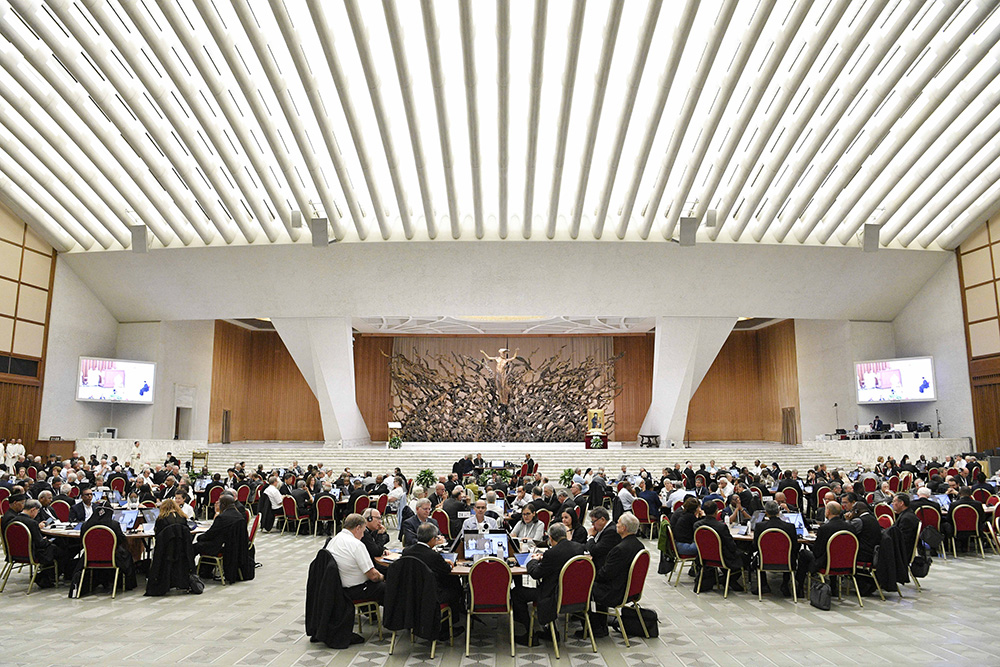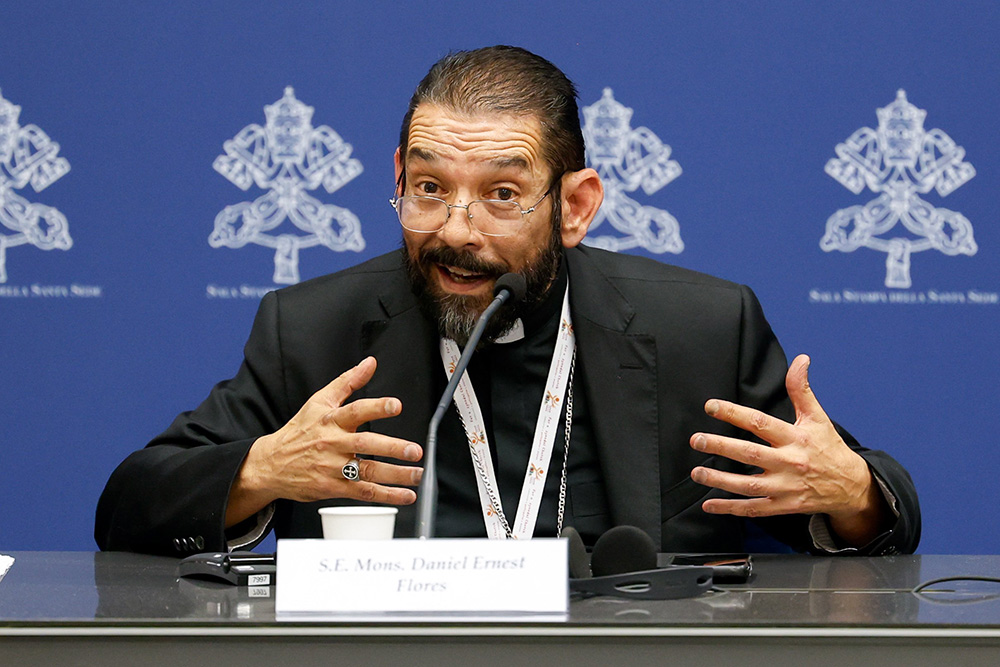
Members of the assembly of the Synod of Bishops gather for morning prayer Oct. 27, 2023, in the Paul VI Audience Hall at the Vatican. (CNS/Vatican Media)
In the next few months, American Catholics will be consulted in preparation for the second and final session of the Synod on Synodality, which will take place next October.
The first session of the synod took place last October after extensive consultations over more than a year. Local churches, dioceses and other institutions held listening sessions and other events where Catholics could air their hopes and concerns about the church. The new round of consultations must be completed in a couple of months so the input can be processed by the U.S. Conference of Catholic Bishops and sent to Rome in a timely fashion.
The American bishops were invited to hold two or three diocesan listening sessions in a Jan. 2 letter from Bishop Daniel Flores of Brownsville, Texas, who, as chair of the U.S.Conference of Catholic Bishops Committee on Doctrine, has acted as the bishops' point man on the synod.
A three- to five-page report on the listening sessions must be sent by each diocese to the bishops' conference by April 8, with the U.S. bishops' conference summary of those sessions due in Rome in May.
This gives bishops little time to organize and hold these meetings, especially if there is going to be any parish participation. It is likely that the bishops will simply invite the same people who participated in the diocesan consultations that took place before the first session of the synod, with very little parish-level input.
If the listening sessions are done properly, they will take a whole day each, not just an hour or two.
Advertisement
Pope Francis would like the entire church to use the same methodology of "conversations in the Spirit" that was used in the synod itself. This involves prayer and presentations by experts on the issues, followed by roundtable discussions in 10-person small groups, which then report their results to the entire assembly.
The roundtable discussions involve three steps. First, each person shares their experience and thoughts on the issue. Then, after a period of silent prayer and reflection, each person shares how they were moved by what they heard. Finally, another period of silent prayer and reflection is followed by an open exchange of views.
The American temptation is to rush the process. We tend to focus on what we individually want to say rather than patiently listening to the Spirit as expressed by others.
According to Flores' letter, the synod secretariat in Rome wants participants to focus on two guiding questions: "Where have I seen or experienced successes — and distresses — within the Church's structure(s)/organization/leadership/life that encourage or hinder the mission?" and "How can the structures and organization of the Church help all the baptized to respond to the call to proclaim the Gospel and to live as a community of love and mercy in Christ?"
Notice two things about these questions.
First, the focus is on "mission" or how to "respond to the call to proclaim the Gospel and to live as a community of love and mercy in Christ?" For Francis, the church is not simply a place where we hold hands and feel good about ourselves; it is outward-looking, a sign and instrument of communion with God and the world. This is the mission of all Catholics, not just the clergy.
We also need to discuss mission priorities. Should we focus on other people's sex lives or on the hungry, the thirsty and the displaced? Is part of the church's mission to be a leader in saving the planet from global warming?

Bishop Daniel Flores of Brownsville, Texas, speaks during a briefing about the assembly of the Synod of Bishops at the Vatican Oct. 19, 2023. (CNS/Lola Gomez)
Should we focus on other people's sex lives or on the hungry, the thirsty and the displaced?
Second, the focus is not on doctrine but structures, organization, leadership and life that encourage or hinder the mission. Perhaps Rome is hoping to avoid controversial debates by presenting the question this way, but in the United States it will be difficult to discuss "leadership" without facing the issues of women's ordination to the deaconate and priesthood, let alone priestly celibacy.
For example, since priestly celibacy was hardly discussed at the first session of the synod, those in favor of optional celibacy need to express their concerns in the diocesan sessions about a less sacramental church — with fewer priests to celebrate the Eucharist, anoint the sick and hear confessions — if they want it on the agenda of the synod.
Discussion of structures and leadership also must focus on the role of the laity in the life of the church. Laypeople are already performing pastoral, charitable and justice ministries, but the decision-making is still tightly controlled by clerics, who too often do not respect the consultative structures of the church. Getting clerics to let go and listen involves conversion and training as seminarians and priests. No wonder the synod put reforming seminary formation on the agenda of the church.
In addition to the diocesan listening sessions, Flores reports that "the USCCB will be holding additional listening sessions at the national level with a focus on participation, social justice, and vocations." Is this an attempt to remove these topics from diocesan discussions? I hope not, but certainly some bishops will use these national discussions as a way of cutting off local discussions.
Little has been revealed about these national discussions. We do know that those involved in the U.S. bishops' conference discussions will be selected from those participating in the diocesan listening sessions.
Flores is aware of the challenges of having such diocesan and national listening sessions. "We all know time is short," he wrote, "but even modest efforts at the local level can bear much fruit. Let us do what we can, as well as we can and trust the Lord to accomplish beyond what we can foresee."
Amen.







